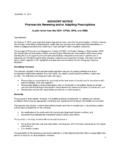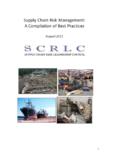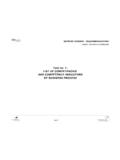Transcription of A Theory of Change - Home - Dignitas International
1 Enhancing Health Systems: A Theory of ChangeWhat is a Theory of Change ?A Theory of Change is an organizational roadmap that defines our vision for the future and how we will achieve it. It encompasses our knowledge and know-how from 10+ years of delivering medical care for people living with HIV and the resulting models of health care delivery. A Theory of Change is designed with a series of Change pathways that result in desired outcomes. Each outcome is linked to one or several actions, revealing the complex web of activity required to bring about real and lasting social Theory of Change will form the foundation for our strategic planning beyond 2016.
2 It will influence the types of projects we undertake, the investments we make in our programs and our team, the partnerships we foster and the opportunities we StoryDignitas International is more than a medical and research organization. We are a family of scientists, innovators, artists, health care providers and humanitarians committed to tackling global health challenges and improving access to health care for all. Our approach includes equal measures of action, compassion and scientific rigor. Add to this a sense of indignation that challenges the status quo when we witness injustice.
3 Ours is a fight for the dignity of our patients, to make sure they receive the care and treatment we would want for ourselves. We are unapologetic about the last decade, we have strengthened access to health care based on sheer vision and grit. Today, we are seen as changemakers in our sector. We aim to strike a balance between a visionary outlook and meeting the challenging realities of today. We are critical of ourselves and constantly look for ways to do and be better. And we always welcome new energy and ideas into our address the next wave of global health challenges, we must be creative, committed and resourceful.
4 We must use the best evidence and experience available. We will continue to hire the best people and maintain an open organizational architecture that allows us to be nimble and responsive. We have no qualms about changing course in order to improve the health of our patients. This is paramount to our Dignitas , we are innovators in global health. We believe in equal access to quality health care. We dare to imagine a world where all people realize their potential for a healthy and productive life. Because with health, anything is HistoryDignitas International was launched as a humanitarian response to a global health catastrophe.
5 In 2004, the AIDS epidemic was ravaging Malawi, a small country in sub-Saharan Africa, destroying its social and economic infrastructure and threatening its very survival as a nation. Without access to treatment and care, AIDS was a death sentence in Malawi. Hospitals were doubling as morgues as patients were literally dying in the corridors. The situation was an affront to human dignity. We began our commitment to addressing this crisis by setting up an HIV clinic in Zomba district, in one of the poorest countries in the world.
6 In our first month at the clinic we started 33 patients on treatment. Today, this figure has climbed to more than 25, Tisungane Clinic was the only health facility offering HIV-related services in the district at the time, many of the sick had to walk for hours and days from their villages to access treatment. Many more didn t make it to our clinic simply because they couldn t afford the cost of a bus ticket. Distance was a critical barrier to health care and was putting tens of thousands of lives at risk. In our view, the fastest and most effective way to reach the rural poor was to bring treatment and care to them.
7 It was a crucial choice. Rather than engaging in direct service delivery, we worked to expand our model of care and trained health workers across the district to deliver HIV the very beginning, we wanted to create ripple effects that would improve health care across Malawi. We also knew that if our efforts had a lasting positive impact on patients, we could leverage this knowledge to help others beyond Malawi s borders. So we developed a robust research program to measure our successes and failures, and to publish findings that would be of use to health care providers facing similar challenges all over the world.
8 Today, we are supporting 164 health centres in 6 districts, covering a population of more than million people. From a standing start in 2004, we have helped more than million people get tested for HIV and helped over 244,000 people start lifesaving treatment. We are proud to have played our part in responding to the devastation of AIDS in Malawi but our work is far from over. With HIV shifting to a manageable chronic condition, non-communicable diseases like diabetes, hypertension and cervical cancer are predicted to become the leading killers in Africa by the year 2030.
9 These conditions are particularly prevalent for people living with HIV. It is clear that effective health care cannot be separated into disease-specific silos. We envision an integrated model so that patients can access a range of health services during a single visit at a local health centre. Going forward, we will continue to use our experience and expertise in HIV as an entry point to addressing broader health issues in other regions. In 2014, we launched our Aboriginal Health Partners Program, where we are leveraging knowledge gained in Malawi to strengthen health care delivery in Northern Ontario, where health worker shortages and distance to health facilities remain key the coming years, we will work to improve lives by developing and implementing models of care and sustainable solutions to global health challenges.
10 By adapting our approach to respond to an evolving context, we remain true to our founding vision: to seek tangible benefits for our patients through evi-dence-based initiatives, which can be applied around the response to the AIDS epidemic, Dignitas International opens Tisungane Clinic in partnership with the Malawi Minstry of Health, dramatically increasing access to HIV-related treatment and funding from Grand Challenges Canada, Dignitas kicks off training to help health workers provide integrated care for HIV and non-communicable diseases like hypertension, diabetes and cervical with African and Canadian partners.







